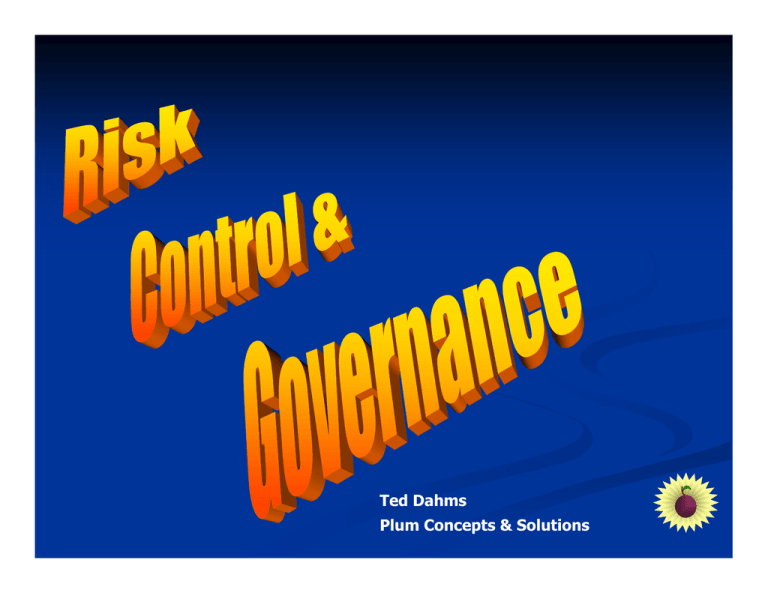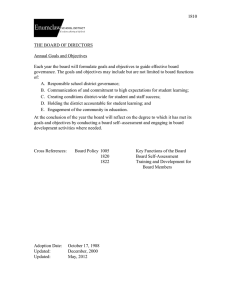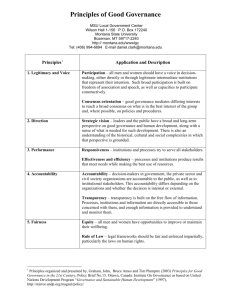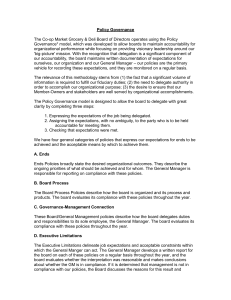Ted Dahms Plum Concepts & Solutions
advertisement

Ted Dahms Plum Concepts & Solutions OVERVIEW Risk & Control Risk, Control & Governance Management principles & governance frameworks Implementation Conceptual Evolution 1998 – governance & risk reviews Governance What How & risk – relationship? is Governance? does one evaluate? Risk & Control Concepts with different origins Internal control – accounting profession Risk management – engineering profession – later insurance industry Now inseparable RISK Risk is now defined as the chance of something happening that will have an impact upon objectives. AS/NZ4360 CONTROL Those elements of an organisation including resources, processes, systems, culture, structure and tasks that taken together support people in the achievement of an organisation’s objectives. Accountants Canadian Institute of Chartered SOFT CONTROLS Soft controls = new concept in control Bureaucratic control – command/control Soft controls – Leadership Capability Team work Accountability Values Flexibility Communication Anticipation RISK STEPS Identification – you can’t manage what you don’t know Analysis – likelihood and consequence Assessment – Level of risk Treatment – Plans to Manage risks Monitor and Review – Risks are dynamic GOVERNANCE Definition: Governed Organisation Objectives Controlled The control environment provides reasonable assurance that objectives will be achieved within an acceptable degree of residual risk. GOVERNANCE & RISK Paradox – Governance definitions rigid concept Unexpected threats Opportunities Governance Risk Management Glue Resilience Management Principles Corporate Governance Management Tools Logical Interrelated set of principles Management Principles Setting corporate goals and objectives Developing an organisational structure Clarity of roles and responsibilities Matching authority – delegations Code of Conduct Management Principles Monitoring & Reviewing Conformance Performance Reporting Information systems Frameworks No one framework that suits all Varies even within the one legislative environment Mandatory structures Discretionary structures Private Sector Framework SHAREHOLDERS Delegated Authority ACCOUNTABILITY Directors on Board Delegated Authority ACCOUNTABILITY CEO Departmental Framework MINISTER & PARLIAMENT Delegated Authority ACCOUNTABILITY ACCOUNTABLE OFFICER Delegated Authority ACCOUNTABILITY DEPARTMENTAL OFFICERS Implementation Don’t have to abandon all you are currently doing! Evolutionary not revolutionary Cultural shift – transformational change Compliance to a performance focus Committed and competent managers Key Competencies Systems Thinking Governance Learning Organisation Trust & Relationships Systems Thinking Complexity broken down for understanding Predisposes silos Autonomy never absolute – holistic view Not closed systems - Co-evolving Learning Institution Adaptive and generative learning Shared vision - open communication Climate of commitment & trust Alignment of ideas ´ Team learning Risk taking encouraged Trust & Relationships Grounded in ethical concepts Interdependent Essential Without agents need trust for team learning – innovation and synergy do not flourish retain command/control structures Focus on conformance not performance Competencies Competencies matched to goals Sound HR practices Maintain alignment Strategic HR planning – a must Summary Objectives = purpose & focus Risk = Control = Governance Risk = resilience Strategies = Objectives + Risk Risk is pervasive Risk Management practitioners – key role Questions? Ted Dahms edahms@bigpond.net.au




